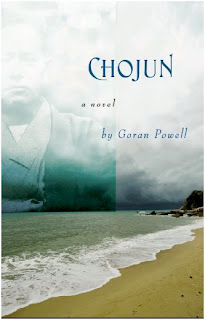
The 2012 Golden Mask Award
for my favorite Net Galley book
I read this year
Chojun Miyagi (1888-1953) was the founder of Goju-ryu Karate . He was born in Naha, the capital of Okinawa prefecture on the main island. This book is largely the memories of his fictional student, Kenichi Ota. There is an amazingly compelling description of how Kenichi first encountered Miyagi practicing karate during a typhoon. I was transfixed by the majesty of that moment. It was the point where this book grabbed me and didn't let me go for an instant.
When Kenichi began learning karate from Miyagi, it wasn't called karate. From other sources online, I discovered that it was often called Naha-te after the city of Naha where it was taught. Yet this conceals the origins of karate. In this novel it's known as to-te or "China hand" because Miyagi's teacher, Kanryo Higaonna brought kung fu techniques that he had studied in China back to Okinawa and combined them with traditional Okinawan dance moves. This reminds me of Capoeira , an Afro-Brazilian practice that combines martial arts and dance.
I believe that one of Goran Powell's themes in this novel is the power of multi-cultural fusion. Purity is a big Japanese cultural concern, but fusion is so much stronger. Kenichi himself was part-Chinese, descended from a community of Chinese that were sent to Okinawa during the Ming Dynasty.
Powell shows us that Miyagi was always conscious of his debt to Chinese kung fu, yet he also has Miyagi announce in 1939 that the art's name has been changed to karate because China and Japan were at war. Kara-te means "empty hand". Many explain this as a reference to the fact that karate is unarmed combat, but Chojun refers to a samurai text called The Book of the Five Rings which includes The Book of Void , a Zen Buddhist concept. I note that Powell's first novel A Sudden Dawn, is the story of how the Buddhist theologian, Bodhidharma originated what became the practice of the warrior monks of Shaolin. Here's a link to a Review of a Sudden Dawn in the Huffington Post by martial arts novelist, Arthur Rosenfeld.
I've never read a martial arts novel with as much depth as Chojun. The depth is not just in the depiction of karate, but in the immersion of the reader in the history and culture of Okinawa. I really appreciated this book.



No comments:
Post a Comment